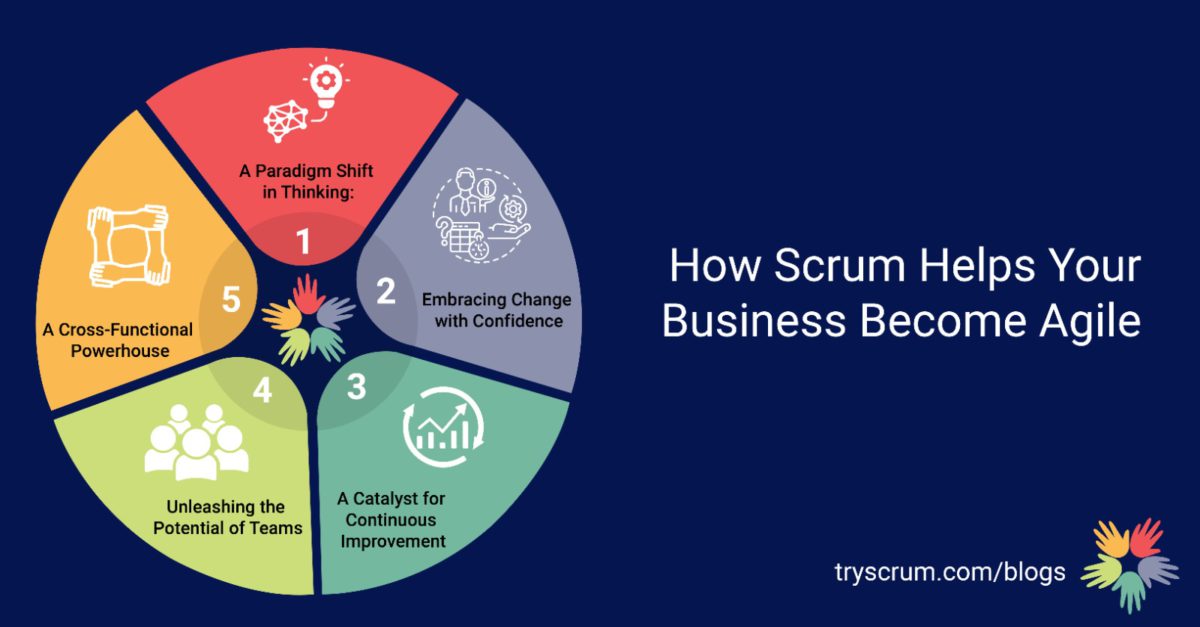In today’s rapidly changing business landscape, staying ahead of the competition requires organisations to be agile, adaptive, and responsive. Yet, some executives remain sceptical about the ability of Scrum, an agile framework, to enable true business agility. In this blog post, we will address common concerns and debunk misconceptions surrounding Scrum, shedding light on how it can unlock the full potential of your organisation and drive business agility.
A Paradigm Shift in Thinking
Executives often hesitate to embrace Scrum due to a perceived mismatch with traditional management approaches. However, Scrum challenges the conventional mindset by advocating for self-managing teams, iterative practices, and continuous learning. This paradigm shift in thinking allows businesses to become agile, as it breaks down silos, fosters collaboration, and empowers teams to make data-driven decisions.
A Cross-Functional Powerhouse
Contrary to the belief that Scrum is only suitable for small teams, it can effectively scale across entire organisations. By forming cross-functional teams that bring together diverse skills and expertise, Scrum unleashes the power of collaboration and breaks down departmental barriers. Through this holistic approach, organisations can deliver value faster, improve problem-solving capabilities, and tap into the collective intelligence of their workforce.
Embracing Change with Confidence
One of the cornerstones of Scrum is its inherent flexibility and adaptability. Executives sometimes fear that embracing Scrum means losing control or constantly changing directions. Scrum provides a structured framework that enables businesses to embrace change confidently. By working in short iterations and regularly gathering customer feedback, Scrum empowers teams to adapt and pivot swiftly, ensuring products and services remain aligned with market demands.
Unleashing the Potential of Teams
One of the frequent questions is whether Scrum can truly enhance team performance. However, Scrum’s emphasis on autonomy, accountability, and continuous improvement unlocks the full potential of teams. By empowering individuals to take ownership of their work, Scrum fosters a culture of innovation, collaboration, and high performance. This results in teams that are not only more engaged and motivated but also better equipped to navigate challenges, meet customer expectations, and drive business results.
A Catalyst for Continuous Improvement
Scrum is not just about delivering projects; it is a framework that encourages organisations to improve and excel continuously. Through regular retrospectives and feedback loops, Scrum enables teams to identify bottlenecks, inefficiencies, and opportunities for enhancement. By actively seeking feedback from both customers and team members, organisations can refine their processes, optimise their operations, and drive a culture of excellence and continuous learning.
Transforming the Organization
While executives may worry that implementing Scrum requires a complete organisational overhaul, the reality is far less daunting. Scrum can be adopted incrementally, allowing organisations to introduce principles and practices gradually. By starting with a pilot project or department, organisations can showcase the tangible benefits of Scrum and build a compelling case for its wider adoption. This pragmatic approach minimises disruption while enabling a smooth transformation towards business agility.
Conclusion
Scrum offers a proven path to unlocking true business agility in a rapidly changing business landscape. By embracing the principles of self-organisation, cross-functional collaboration, adaptability, and continuous improvement, organisations can position themselves for success. Scrum empowers teams, enhances decision-making, and creates a culture of innovation and responsiveness. To executives who may doubt the transformative power of Scrum, it is essential to recognise its ability to enable business agility, drive competitive advantage, and future-proof your organisation in today’s dynamic and unpredictable market.


